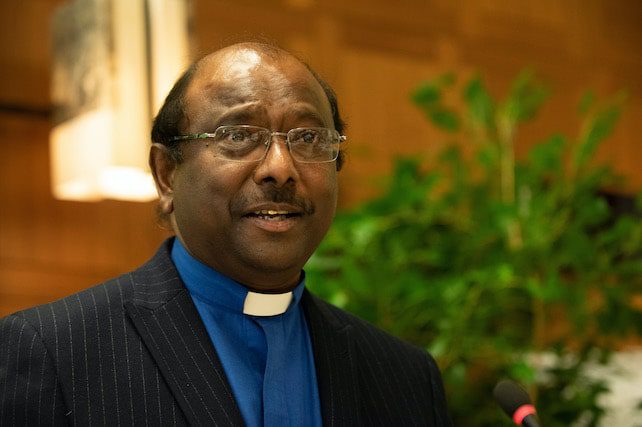(RNS) — The Rev. Jerry Pillay, the Presbyterian minister elected general secretary of the World Council of Churches last month, is taking the helm as the global ecumenical organization is already under pressure to expel the Russian Orthodox Church from its ranks due to Patriarch Kirill of Moscow’s justifications for his country’s brutal invasion of Ukraine.
But that’s not the only controversy the new leader is facing: Pillay has come under fire since his election for past comments comparing the Israeli government’s treatment of Palestinians to his native South Africa’s former apartheid policies.
Pillay, a former general secretary of the Uniting Presbyterian Church in Southern Africa, rebuffed the criticism, saying in a recent interview with Religion News Service that the pressure “comes with the territory.”
Pillay said he plans to tackle the issues facing the WCC head-on when he assumes office at the beginning of next year. “At the end of the day,” he said, “our task is to proclaim God’s name.”
The following interview has been edited for length and clarity.
What are your reactions to your election?
This has been a really great excitement for me. The WCC played a pivotal role in South Africa in the dark days of apartheid. If it was not for the involvement of such ecumenical bodies, we would not have had so much international pressure on the South African government. So for me to be elected into that position is just a joy to, in a sense, give back in thanksgiving, joyfully recognizing the role that the WCC played in our own context.
What do hope to accomplish? Are there any projects that you’re particularly interested in pursuing?
The WCC is an admittedly very wide scope of different churches with a great sense of diversity, with doctrines and theology and views on ethics and so forth. One of the greatest priorities is to work toward the unity of these churches, so that we can indeed create a visible unity to the world in terms of a united Christian witness.
So my first task would be to continue the work of bringing churches together, to seek in unity of churches, to identify and address the major global issues. Things like poverty, things like HIV and AIDS, things like the pandemic, war and conflicts.
The second thing is justice issues. Justice is an important priority for the WCC. What is happening, where is it happening, and how do we speak to it? Where is human dignity at stake and at risk? Where are human beings oppressed and disadvantaged, whether it is through political structures, economic structures — religious structures in that too — and social structures. How does the World Council of Churches actually work toward liberating people and setting them free, as Jesus would say, in his own ministry, “I’ve come to set the captives free”?

